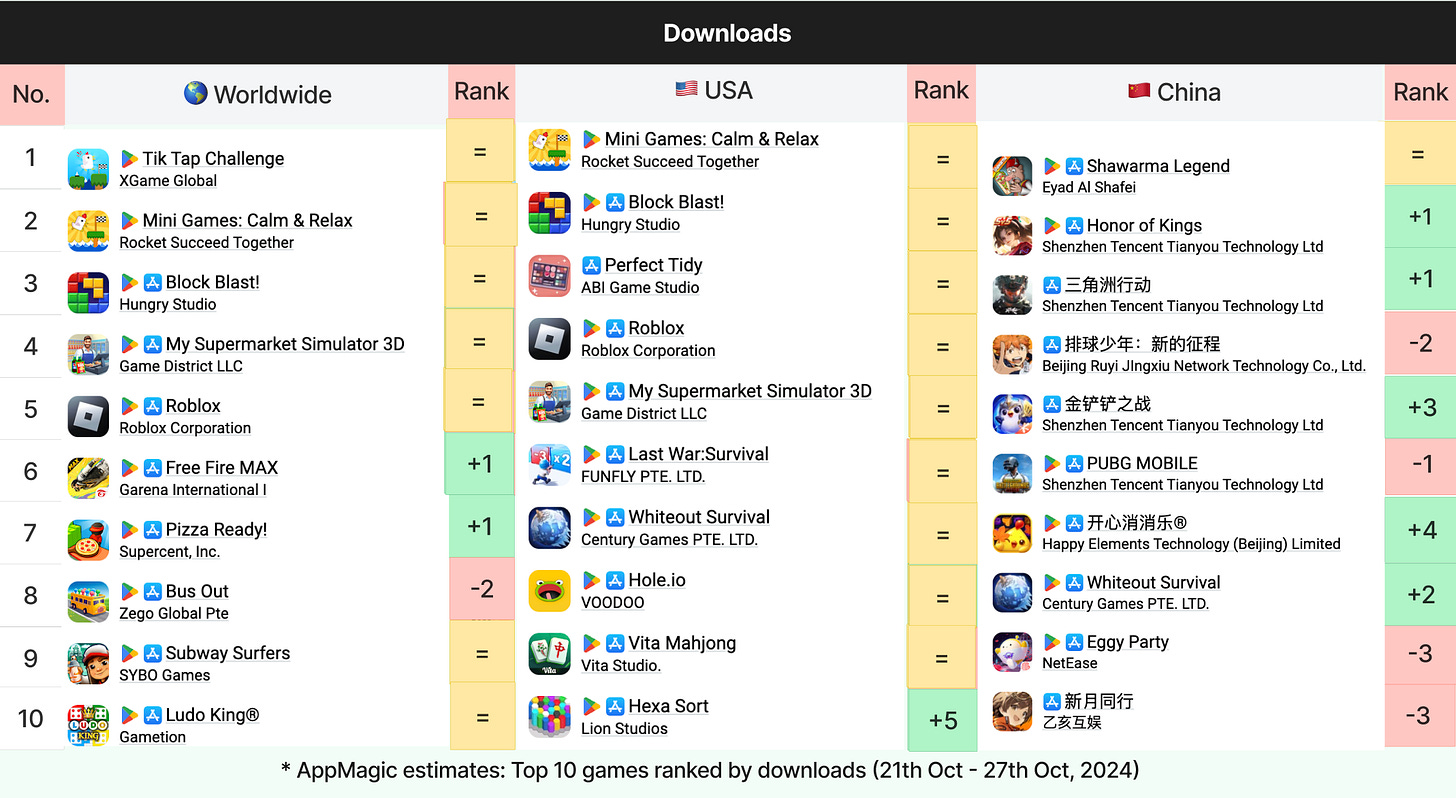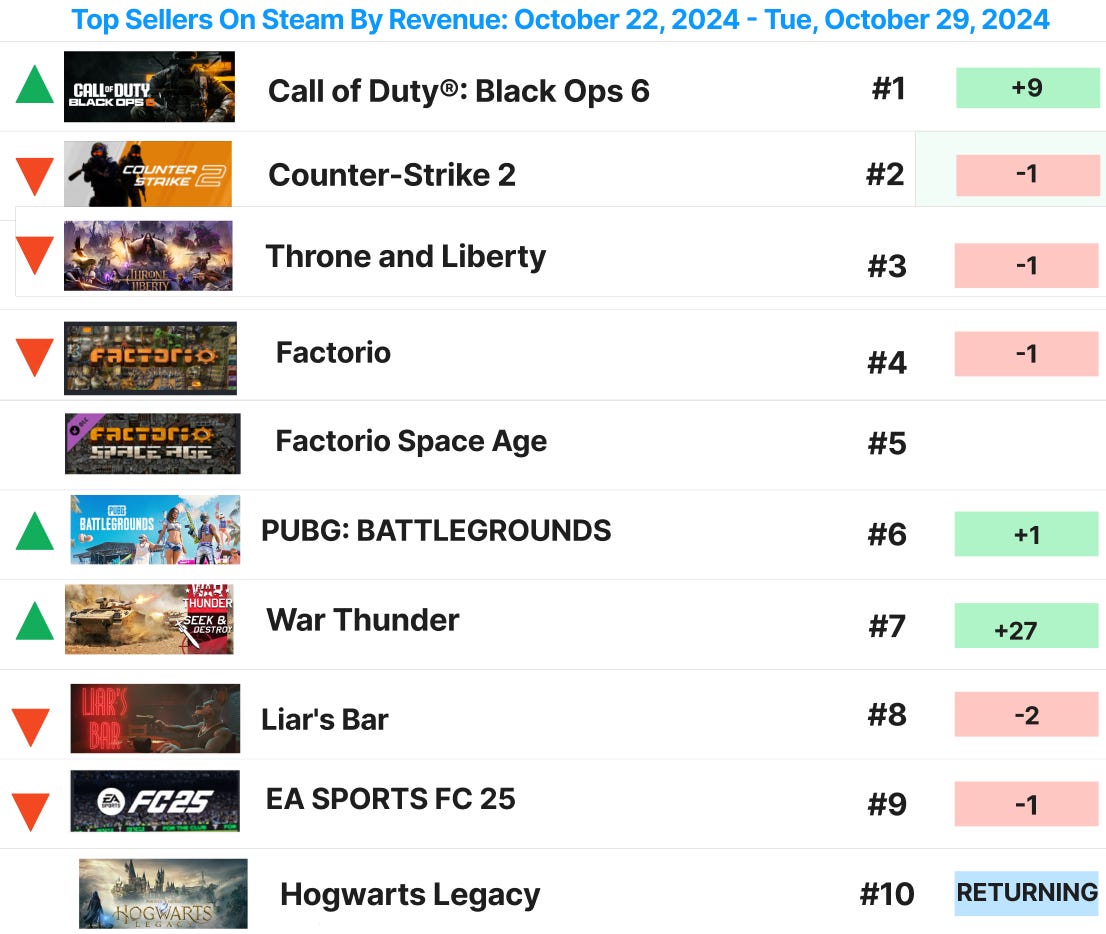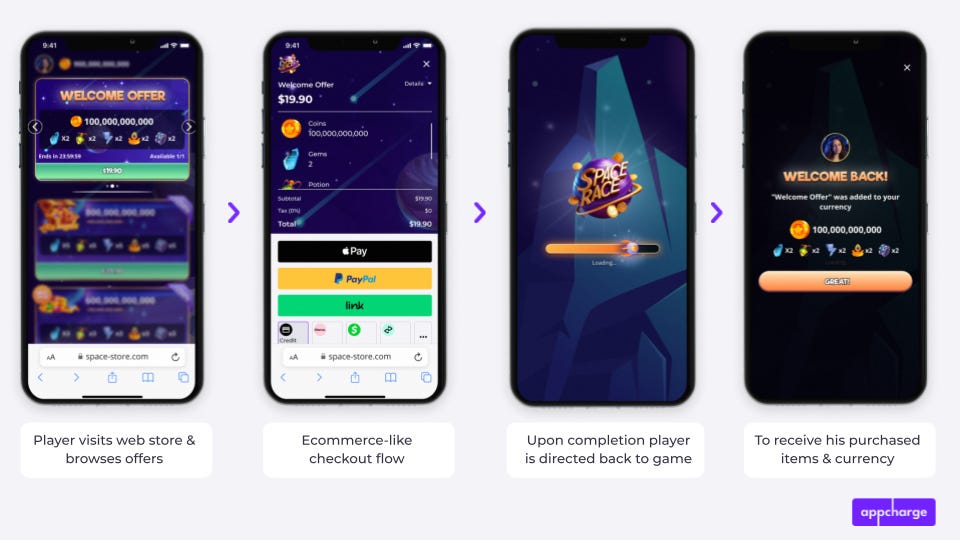📈 Economics & Advantages of Mobile Web Stores
Gil Tov-Ly CMO at Appcharge discusses how game studios are increasingly adopting web stores as a major revenue channel and gaining massive economic advantage
In this week’s MarketWire, we cover the rise of webstores for mobile games and the potential for future alternative app stores. While alternative app stores are just emerging, I’ve been hearing anecdotally that webstores are the real deal. I’ve heard some games generate 30%, 40%, and even up to 60% of their revenue from webstores.
60%/.7 = 25% more revenue overall. This is potentially a massive game-changer for some games.
I spoke to Gil Tov-Ly, CMO of Appcharge, a company helping game studios set up and handle payments through web stores, to understand what is happening. Appcharge, in 2 years, has grown its revenue run rate to $200M. This, to me, indicates significant traction in the space.
Let’s deep dive to find out what’s going on!
In this newsletter:
Top Revenue: Honor of Kings remains at #1 worldwide, as the revenue charts last week were unusually stable. The top three worldwide games are all from China. There is lots to learn from Chinese developers.
Top Downloads: Tik Tap Challenge is #1 worldwide, and Mini Games: Calm & Relax is #2 worldwide and #1 US. Both feature a series of lame mini-games. I'm pretty unsure how these games are doing so well.
Top Steam Revenue: Call of Duty: Black Ops 6 jumped 9 spots to #1 last week.
Highlight—The Rise of Web and Alternative App Stores: I talk with Gil Tov-Ly, CMO of Appcharge, to learn more about what’s going on with the considerable impact and adoption of web stores.
This week, we got pretty stable revenue rankings. Note that the top 3 worldwide revenue games are all from China. I’m sure there’s a lot we can learn from them.
At #9 worldwide, プロ野球スピリッツA (Pro Baseball Spirits) is a baseball simulation game part of a larger series.
At #10 US, Evony has been a mainstay in the top US charts. This makes me feel how much of a missed opportunity Applovin/MZ had with Game of War. Too bad what’s happening there.
Tik Tap Challenge is #1 worldwide, and Mini Games: Calm & Relax is #2 worldwide and #1 US. Both feature a series of lame mini-games. I'm pretty unsure how these games are doing so well.
At #8 worldwide, Bus Out is a puzzle game in which colored people need to be matched with different-colored buses. So it’s very 2024. Lol.
Top 10 Steam Charts by Revenue
New #1 is Call of Duty: Black Ops 6.
At #4 and #5, Factorio is a real-time strategy and simulation game focused on factory building and resource management.
At #8, Liar’s Bar is a multiplayer game focused on bluffing and deception. Players play various games involving lying.
🚀 The Rise of Web Stores in Gaming: A Game-Changing Revenue Strategy
🎧 Listen on Spotify, Apple Podcasts, or Anchor
Speakers:
Joseph Kim. CEO at Lila Games.
Gil Tov-Ly. CMO at Appcharge.
🤓 How It Works
Mobile web stores enable game developers to manage payments from their players directly rather than using the existing built-in app store payment mechanism.
Managing customer payments directly enables game studios to avoid paying the 30% app store payment fees.
The gaming industry is witnessing a significant shift in how studios monetize their games, with web stores emerging as a powerful alternative to direct app store purchases. Here's what every game executive and product leader needs to know about this transformative trend.
🔑 Key Trends and Numbers
In just three years, Tov-Ly suggests over 65% of top-grossing mobile game studios have launched their own web stores
Some game studios are reporting up to 40% of their revenue now coming from web stores
Studios implementing web stores have seen 20-30% increases in total revenue
Appcharge, a leading web store platform, has reached a $200M annual revenue run rate in just 2 years
💰 Economic Benefits
Higher Margins: Studios keep ~95% of revenue from web store purchases vs. 70% through traditional app stores
Expanded Revenue Opportunities: Players often spend more when given additional purchasing options
VIP Player Focus: Web stores are particularly effective for games with high-value players (whales)
Market Size: The in-app purchase market ($110B currently) is expected to grow to $200B by 2030, with web stores potentially capturing 10-20% of that market
🎮 Best Practices for Success
Game Genre Matters: Games with significant spending differentials between average and VIP players (like casino games) see better web store adoption
Trust Building: Ensure web stores maintain a professional look and feel aligned with the game's brand
Player Experience: Focus on seamless integration and clear value proposition for players
VIP Strategy: Consider making web stores exclusive to VIP players initially to build momentum
🛠️ Implementation Considerations
Build vs. Partner: Studios can build in-house (requiring significant resources) or partner with specialized providers
Feature Requirements:
Payment processing and fraud prevention
Multiple currency support
Local payment methods
Tax compliance
User authentication
Analytics and tracking
🚫 Current Limitations
Most regions still restrict in-app links to web stores
Studios cannot actively promote web stores within their games
Platform constraints on payment provider choices remain
Geographic regulations vary
🔮 Future Outlook
Alternative app stores (like Epic Games Store on iOS in the EU) are beginning to emerge
Regulatory changes may enable more direct player relationships
The industry is moving toward a multi-channel distribution and monetization model
Web stores are becoming the "new norm" rather than just a trend
💡 Strategic Benefits Beyond Revenue
Direct Player Relationships: Build stronger connections without platform intermediaries
Marketing Control: Ability to run direct promotional campaigns
Data Ownership: Better understanding of player behavior and preferences
Flexibility: More control over pricing and promotional strategies
Player Engagement: Web stores can become an additional meta-game element for engaged players
For game studios considering web store implementation, it's crucial to understand that success requires more than just technical implementation - it needs a strategic approach to player communication, value proposition, and long-term relationship building. As the industry continues to evolve, web stores are becoming an increasingly important part of a comprehensive monetization strategy.
Have you implemented a web store for your game? I'd love to hear about your experiences in the comments below!









